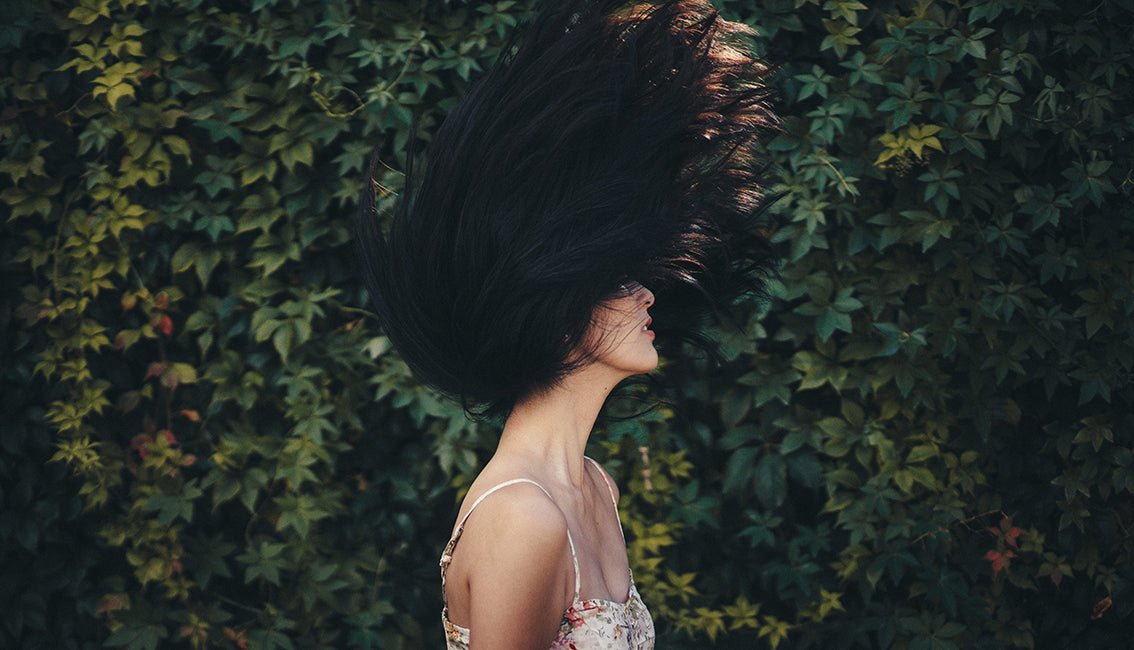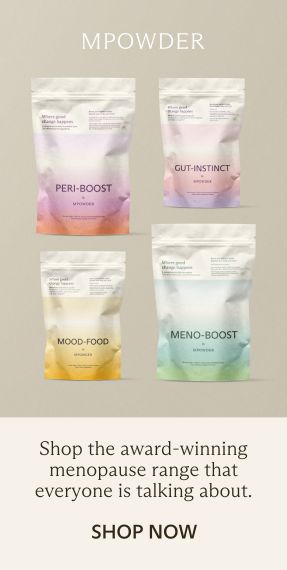My grandmother used to call my white blond hair my crowning glory. As I became a teenager I wore it long (sometimes with a perm - don’t judge me, it was the 80s). As I explored my identity I would save up for a train fare to London and head to the Vidal Sassoon Academy on Saturday mornings to let the trainee hairdressers do whatever they wanted. From buzz cuts to purple streaks, my hair was fundamental to me. It was how I was recognised. And formed how I saw myself. Motherhood gave me thick, lustrous hair for the first time in my life. And then took it away again!
And, one of my first symptoms of perimenopause was a shift in hair texture and an overall thinning, especially around the front of my head. And, although MPowder Peri-Boost blend has helped a lot, some days I still mourn it.
A few weeks’ ago we hosted a brilliant Instagram LIVE with Josh Wood, founder of the eponymous Josh Wood Colour and the talent behind many of the most coveted heads of hair in Hollywood! Josh has supported women through menopause many times and, although every individual will have different needs and goals for their hair, he provided some invaluable insight and advice on how each of us can manage our hair well.
Keep it clean
Josh is a great believer in clean hair. So rather than avoiding washing, which is often what we're taught to do when our hair is fragile, wash it. Prepare for the wash by brushing your hair so it is free of tangles first. And use a gentle shampoo.
Focus on the scalp
A clean scalp will also promote good cell turnover and promote a healthy environment for optimal hair growth. Just like anti-aging skin care, exfoliation of the scalp is important to remove dead skin cells from around the follicle and promote a healthy follicle. Follicles that are full of sebum or blocked by dead skin, dandruff or infection will have an impact on the quality of hair growth too. Permanently blocked or obstructed follicles may eventually cease to produce hair at all. As we learn more about ‘scalp health’, there has been an explosion of products to the market. Gallinee Prebiotic scalp and hair serum is gaining a real fan base - with a focus on rebalancing the scalp biome….
Make the most of your conditioner
Have a comb in the shower and gently comb conditioner right through to the lengths of your hair every time you wash it. And invest in a good weekly hair mask. Josh Wood Colour’s Miracle Mask is a good place to start. Avoid overly harsh heat styling every day.
Think about how you use colour
A good colour is not just about complimenting your skin tone. If used well it can create a sense of texture and depth of field. Lowlights and also a deliberate darkening of the roots of your hair can make it feel thicker and more voluminous.
Don’t forget to play
Menopause is a transition. And sometimes, when we’re in it, the temptation is to try and keep everything ‘as it was’. If we’re not careful, this can make everything feel harder. More brittle. Let go of what doesn’t serve you. Remember to play - with colour, with style. Think about what you want part 2 to look and feel like. And celebrate that with your hair. Play can be subtle. It can be temporary. But rediscovering the joy that comes from being a little irreverent with our hair, can be liberating.
Master new styles
If your hair is long, but you’re worried about thickness and texture, remember you don’t have to wear it down. Look at how updos and pinning can celebrate length and disguise hair loss. A stylish chignon or bun can feel sophisticated and on-trend and don’t rely on thickness to work.
But, perhaps his biggest tip was to talk to your hairdresser if you feel able. You will not be the first person to sit in the chair experiencing changes. Your hairdresser is your ally. Let them share what they’ve seen work.
If you are experiencing hair loss it is important to see a medical professional to diagnose the source of this issue - and discount other underlying conditions.
Please don’t feel ashamed about booking an appointment. This isn’t about vanity. It’s about your health. It matters.
HRT may be suggested. By replacing some of the progesterone and oestrogen we lose in midlife, it can help in restoring hair.
We also see strong results in hair condition by boosting what is on your plate. Look to the following:
PROTEIN
Keratin is a protein and the building block of your hair, and whilst it is not directly found in food, its production is directly affected by how much protein is in your diet. A lack of protein in your diet can have a lasting impact on your hair health, especially during perimenopause and menopause. Look to protein rich foods such as red meat, beans, fish and eggs, nuts and seeds as well as vegetables such as kale and asparagus.
NIACIN
Niacin is the little known solution to hair woes and can be an excellent addition when promoting healthy hair during menopause. It can improve blood circulation to the scalp, which in turn brings oxygen and other nutrients to your hair follicles. Two tablespoons of peanut butter deliver around 25% of your daily RDA of Niacin. You can also find it in avocado, oily fish and some white meats.
IRON
It is essential to consume enough iron in your diet - particularly in menopause. Iron keeps our hair healthy by contributing to increased blood flow to the scalp and, as a result, improved maintenance of your hair follicles. There are many sources of iron outside red meat too. Many of which have multiple benefits for our bodies and minds Seek out lentils, chickpeas, beans, tofu, cashew nuts, chia seeds, ground linseed, hemp seeds, pumpkin seeds, kale, dried apricots, figs, raisins and quinoa.
PAY ATTENTION TO THE RIGHT VITAMINS
Vitamin C is essential for maintaining healthy hair during menopause. Not only can it help promote healthy hair growth, but it can also stimulate regrowth after hair loss. Vitamin A can increase the speed of cell regeneration and synthesis. Therefore, a deficiency can have a direct effect on our hair. It is key for moisturising your hair and preventing it getting brittle. Vitamin B12 promotes healthy blood flow as it helps in the production of red blood cells. This in turn impacts oxygen supply to our hair follicles. Look to oily fish or a supplement.
Many experts believe that a deficiency in zinc can lead to the breakdown of the protein structures in your hair follicle, which can lead to hair loss. It is also believed to play an important role in DNA production and can help regulate your hormones, which can be important if your hair loss is indeed caused by a hormonal imbalance. Look to nuts, chickpeas, sweet potatoes and spinach to increase your dose.
Finally, remember, all transitory phases are just that. Our bodies settle. Many of us will experience regrowth as our hormones settle. And, if we don’t, there is agency in rethinking how our hair should reflect our personalities in Part 2. To seek out expertise. To experiment. And to remind ourselves that one of the best bits about hair is the opportunity to play.
With love Rebekah and the MPowder Team.
Share Twitter Facebook Pinterest

